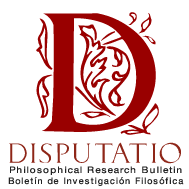Danielle Cohen-Levinas
Université Paris 4-Sorbonne, France | d.cl@free.fr
Received: 6-August-2015 | Accepted: 29-October-2015 | Published: 31-December-2018
Disputatio [Dec. 2018], Vol. 7, No. 8, a020 | DOI: 10.5281/zenodo.2567348
Article | [ES] | Full Text | Statistics | Copyright Notice [es] | Vol. 7 No. 8
How to cite this article:
Cohen-Levinas, Danielle (2018). «Prolegómenos a la idea musical: Sócrates músico». Disputatio. Philosophical Research Bulletin 7, no. 8: a020.
Abstract | This article focuses on the analysis of the complex and constant relationship between music and philosophy, between musical idea and philosophical idea: from its understanding in Platonic thought to its delimitation in Adorno’s philosophy; from philosophy as a place of true music to music as space that guides philosophy to interpretation and saves writing from a content always expressible, exposed to judgment and evaluation. In the relationship between philosophical idea and musical idea, the hermeneutical interpreter and the musical performer hold the overcoming of the dichotomy, at the opening of a mutual questioning. The author presents the dialogue between Socrates and Adorno, open from the beginning. Finally, the musical idea is not displayed in the accumulation of words, concepts or theories, but in the ability to bring out a more essential content than the sum of all words.
Keywords | Socrates · Adorno · Philosophical Idea · Musical Idea · Dodecaphonism.
![]()
Prolegómenos a la idea musical: Sócrates músico
Resumen | El artículo se centra en el análisis de la relación compleja y constante entre música y filosofía, entre idea musical e idea filosófica: desde su comprensión en el pensamiento platónico hasta su delimitación en la filosofía de Adorno; desde la filosofía como lugar de la verdadera música hasta la música como espacio que orienta a la filosofía hacia la interpretación y que salva a la escritura de un contenido siempre expresable, expuesto al juicio y a la evaluación. En la relación entre idea filosófica e idea musical, el intérprete hermenéutico y el intérprete musical sostienen la superación de la dicotomía, en la apertura de un cuestionamiento mutuo. Presenta la autora el diálogo entre Sócrates y Adorno, abierto desde el principio. Finalmente, la idea musical no se muestra en la acumulación de palabras, de conceptos o de teorías, sino en la capacidad de hacer emerger un contenido más esencial que la suma de todas las palabras.
Palabras Clave | Sócrates · Adorno · Idea Filosófica · Idea Musical · Dodecafonismo.
References
Adorno, Theodor W. (1930). «Reaktion und Fortschritt». Anbruch 12: pp. 191-195. Reimpreso en: Briefwechsel, Theodor W. Adorno et Ernst Krenek. Frankfurt/Main: Suhrlamp, 1974.
Adorno, Theodor W. (1962). Philosophie de la nouvelle musique, trad. de Hans Hildenbraud y Alex Lindenberg. París: Gallimard.
Adorno, Theodor W. (1982). Quasi una fantasia, trad. de Jean-Louis Leleu. París: Gallimard.
Adorno, Theodor W. (1989). Alban Berg, le maître de la transition infime. París : Gallimard.
Adorno, Theodor W. (1992). Dialectique négative. París: ed. Payot (col. «Critique de la politique»).
Adorno, Theodor W. (1995). Théorie esthétique, trad. de Marc Jimenez y Eliane Kaufholz. París: Klinsieck.
Benjamin, Walter (1985). Origine du drame baroque allemand, trad. S. Müller. París: Flammarion.
Benjamin, Walter (1986). Le concept de critique d’art dans le romantisme allemand. París: Flammarion.
Berg, Alban (1985). Écrits, trad. de Pousseur, Tillier y Collins. París: Christian Bourgois.
Levinas, Emmanuel (1981). De l’existence à l’existant. París: Vrin, 1981.
Quignard, Pascal (1990). Petits Traités. Vol. IV. París: Maeght.
Ricoeur, Paul (1986). Du texte à l’action. París: ed. du Seuil.
Webern, Anton (1980). Chemins vers la nouvelle musique. París: Jean-Claude Lattès.
© The author(s) 2018. This work, published by Disputatio [www.disputatio.eu], is an Open Access article distributed under the terms of the Creative Commons License [BY–NC–ND]. The copy, distribution and public communication of this work will be according to the copyright notice. For inquiries and permissions, please email: boletin@disputatio.eu.
